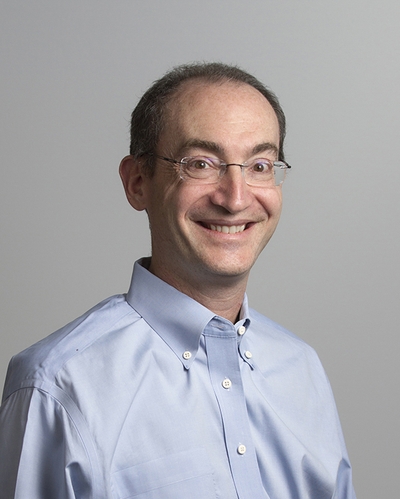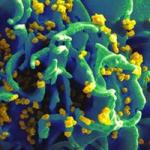
Eric A. Engels, M.D., M.P.H
Senior Investigator
Infections and Immunoepidemiology Branch
NCI/DCEG
Research Topics
Dr. Eric Engels focuses his research on immunosuppression and infection in cancer.
A major focus of investigation concerns the epidemiology of cancer in immunosuppressed individuals. My research on HIV-related cancers utilizes data from our HIV/AIDS Cancer Match (HACM) Study. This study links HIV and cancer registry data from 14 U.S. regions to identify cancers arising in over 850,000 people registered with HIV infection. The HACM Study allows my colleagues and me to address important research questions and examine patterns of cancer incidence that have direct public health relevance. We have used this resource to characterize trends in cancer risk among people with HIV over the entire course of the HIV epidemic. Our studies have documented substantial declines over time in cancers caused by viral infections, such as Kaposi sarcoma and non-Hodgkin lymphoma, as HIV treatment has improved. In contrast, there has been an increase in the burden of cancers not associated with immunosuppression, especially as the number of people living with HIV increases and as the HIV population ages.
My coworkers and I also conduct research on cancer in solid organ transplant recipients, another immunosuppressed population. We have conducted a computerized match of the U.S. transplant registry with 34 cancer registries. This Transplant Cancer Match Study includes population-based cancer data on 511,000 (68% of the U.S. transplant population). Using these data, we have described the overall spectrum of cancer risk in transplant recipients, and we are doing further research projects focused on specific cancers and transplant-related risk factors.
I am also interested in cancers associated with other immune-related conditions, including autoimmune diseases, allergic conditions, and immunosenescence. The incidence of some cancers is elevated in relation to immune activation or inflammation, and some immune-modulating medications used to treat these conditions may also increase cancer risk. Finally, we are studying how immunosuppressive medical conditions such as HIV infection and solid organ transplantation affect patient outcomes after a cancer diagnosis.
Biography
Dr. Engels earned a B.A. in mathematics from the University of Virginia in 1987 and an M.D. from Harvard Medical School in 1991. From 1991 to 1994, he trained in internal medicine at Brigham and Women's Hospital. Subsequently, Dr. Engels received clinical training in infectious diseases and an M.P.H. at Tufts University School of Medicine. He joined the NCI Viral Epidemiology Branch (later the Infections and Immunoepidemiology Branch (IIB)) in 1998 as a senior staff fellow, became an investigator in 2000, and was tenured in 2007. He was appointed Chief of IIB in 2017. Dr. Engels holds an adjunct faculty appointment in the Department of Epidemiology at the Johns Hopkins School of Public Health. In 2022, he was elected as a Fellow of the American Association for the Advancement of Science.
Selected Publications
- Engels EA, Pfeiffer RM, Fraumeni JF Jr, Kasiske BL, Israni AK, Snyder JJ, Wolfe RA, Goodrich NP, Bayakly AR, Clarke CA, Copeland G, Finch JL, Fleissner ML, Goodman MT, Kahn A, Koch L, Lynch CF, Madeleine MM, Pawlish K, Rao C, Williams MA, Castenson D, Curry M, Parsons R, Fant G, Lin M. Spectrum of cancer risk among US solid organ transplant recipients. JAMA. 2011;306(17):1891-901.
- Engels EA, Haber G, Hart A, Lynch CF, Li J, Pawlish KS, Qiao B, Yu KJ, Pfeiffer RM. Predicted Cure and Survival Among Transplant Recipients With a Previous Cancer Diagnosis. J Clin Oncol. 2021;39(36):4039-4048.
- Shiels MS, Pfeiffer RM, Hall HI, Li J, Goedert JJ, Morton LM, Hartge P, Engels EA. Proportions of Kaposi sarcoma, selected non-Hodgkin lymphomas, and cervical cancer in the United States occurring in persons with AIDS, 1980-2007. JAMA. 2011;305(14):1450-9.
- Shiels MS, Islam JY, Rosenberg PS, Hall HI, Jacobson E, Engels EA. Projected Cancer Incidence Rates and Burden of Incident Cancer Cases in HIV-Infected Adults in the United States Through 2030. Ann Intern Med. 2018;168(12):866-873.
- Wang JH, Derkach A, Pfeiffer RM, Engels EA. Immune-related conditions and cancer-specific mortality among older adults with cancer in the United States. Int J Cancer. 2022;151(8):1216-1227.
Related Scientific Focus Areas
This page was last updated on Friday, January 9, 2026



